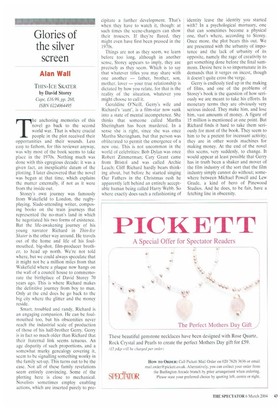Glories of the silver screen
Alan Wall
THIN-ICE SKATER by David Storey Cape. ,fI6.99, pp. 268, ISBN 0224064495
The anchoring memories of this novel go back to the second world war. That is where crucial people in the plot received their opportunities and their wounds. Less easy to fathom, for this reviewer anyway, was why most of the book seems to take place in the 1970s. Nothing much was done with this egregious decade: it was a given fact, an inexplicable datum of the plotting. I later discovered that the novel was begun at that time, which explains the matter externally, if not as it were from the inside out.
Storey's own journey was famously from Wakefield to London, the rugbyplaying, Slade-attending writer, composing books on the train journeys that represented the no-man's land in which he negotiated his two forms of existence. But the life-awakening journey of his young narrator Richard in Thin-Ice Skater is the other way around. He travels Out of the home and life of his foulmouthed, big-shot, film-producer brother, to head up north. We're not told where, but we could always speculate that it might not be a million miles from that Wakefield where a plaque now hangs on the wall of a council house to commemorate the birthplace of David Storey 70 years ago. This is where Richard makes the definitive journey from boy to man. Only at the end does he go back to the big city where the glitter and the money reside.
Smart, troubled and randy, Richard is an engaging companion. He can be foulmouthed too, but his obscenities never reach the industrial scale of production of those of his half-brother Gerry. Gerry is in fact so much older than Richard that their fraternal link seems tenuous. An age disparity of such proportions, and a somewhat murky genealogy covering it, seem to be signalling something wonky in the family set-up. This turns out to be the case. Not all of these family revelations seem entirely convincing. Some of the plotting here is close to mechanical. Novelists sometimes employ enabling actions, which are inserted purely to pre
cipitate a further development. That's when they have to watch it, though: at such times the scene-changers can show their trousers. If they're flared, they might even have first been pressed in the 1970s.
Things are not as they seem, we learn before too long, although in another sense. Storey appears to imply, they are precisely as they seem. Which is to say that whatever titles you may share with one another — father, brother, son, mother, lover — your true relationship is dictated by how you relate, for that is the reality of the situation, whatever you might choose to call it.
Geraldine O'Neill, Gerry's wife and Richard's 'aunt', is a film-star now sunk into a state of mental incompetence. She thinks that someone called Martha Sheringham has been murdered. In a sense she is right, since she was once Martha Sheringharn, but that person was obliterated to permit the emergence of a new one. This is not uncommon in the world of celebrities: Bob Dylan was once Robert Zimmerman; Cary Grant came from Bristol and was called Archie Leach; Cliff Richard hardly bears thinking about, but before he started singing Our Fathers in the Christmas rush he apparently left behind an entirely acceptable human being called Harry Webb. So where exactly does such a refashioning of identity leave the identity you started with? In a psychological mortuary, one that can sometimes become a physical one, that's where, according to Storey. Once more, the plot bears this out. We are presented with the urbanity of impotence and the lack of urbanity of its opposite, namely the rage of creativity to get something done before the final summons. Desire here is so importunate in its demands that it verges on incest, though it doesn't quite cross the verge.
Gerry is endlessly tied up in the making of films, and one of the problems of Storey's book is the question of how seriously we are meant to take his efforts. In monetary terms they are obviously very serious indeed. They make him, and lose him, vast amounts of money. A figure of 15 million is mentioned at one point. But Richard finds it hard to take them seriously for most of the book. They seem to him to be a pretext for incessant activity; they are in other words machines for making money. At the end of the novel this seems, very suddenly, to change. It would appear at least possible that Gerry has in truth been a shaker and mover of the film industry of the sort that the film industry simply cannot do without; somewhere between Michael Powell and Lew Grade, a kind of hero of Pinewood Studios. And he does, to be fair, have a fetching line in obscenity.


















































































 Previous page
Previous page